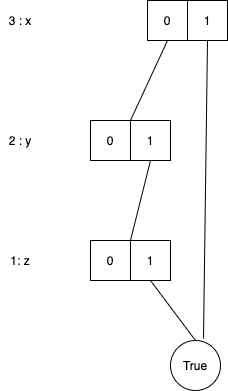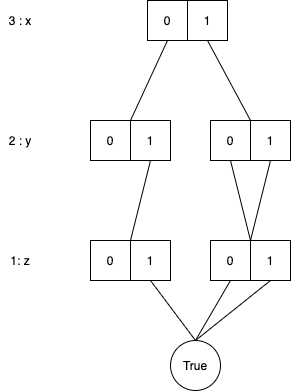Build MDD from function
Build an MDD for Boolean function $f = x \vee (y \wedge z)$
Truth Table
| $x$ | $y$ | $z$ | $f$ |
|---|---|---|---|
| 0 | 0 | 0 | 0 |
| 0 | 0 | 1 | 0 |
| 0 | 1 | 0 | 0 |
| 0 | 1 | 1 | 1 |
| 1 | 0 | 0 | 1 |
| 1 | 0 | 1 | 1 |
| 1 | 1 | 0 | 1 |
| 1 | 1 | 1 | 1 |
Preliminaries
-
An MDD in MEDDLY, is characterized by an object of class forest. Each forest is built upon a domain of variables and belongs to certain category which is specified as per the set/function that needs to be represented.
-
To start with building MDD, each $v$ of the variables from the function is assigned a level, $k$ such that $var(k) = v$. In this example, $x = var(3), y = var(2), z = var(1).$
-
Since the function here is Boolean, the domain of each variable is [0,1]. The output of the function is also Boolean, which is defined by the terminals of the MDD.
Create Domain
domain* d = createDomain();
d->createVariablesBottomUp(var_bounds, num_of_vars);
num_of_vars = 3 var_bounds : var_bounds[$i$] = 2, $\forall i\in$ [0 , num_of_vars-1]
Create Forest on the Domain
forest* mdd = d->createForest(false, range_type::BOOLEAN, edge_labeling::MULTI_TERMINAL);
createForest() takes parameter for whether mdd is for relations, range of terminals and edge labelling range.
Create an MDD edge from an element of truth table
dd_edge first(mdd);
mdd->createEdge(element, 1, first);
element : element[$i$] = $var(i)$.val, $\forall i \in$ [1,3]. Default value of element[0] (terminal) is true.
Add multiple elements into MDD.
- Via createEdge() only : User can pass all elements that evaluate to $f = 1$ and MEDDLY will take care of adding them to the forest. All elements can be stored in an array and passed into createEdge(), like above example :
dd_edge all(mdd);
mdd->createEdge(elementList, 5, all);
elementList : elementList[$j$] = element, $\forall j \in$ [1,5]
- Via createEdge() and UNION operation : User can pass elements one-by-one and explicitly union them.
dd_edge result(mdd);
for each true element that from truth-table :
mdd->createEdge(element,1,first);
apply(UNION, first, result, result);
result.show(std::cout, 0) will display the stored mdd.
Setting forest policies
Default forest policies for MDD is Fully-reduced.

If forest policies are set to Quasi-reduced :
forest::policies pmdd(false); // false - not for relations
pmdd.setQuasiReduced();
forest* mdd = d->createForest(false, range_type::BOOLEAN, edge_labeling::MULTI_TERMINAL, pmdd);
